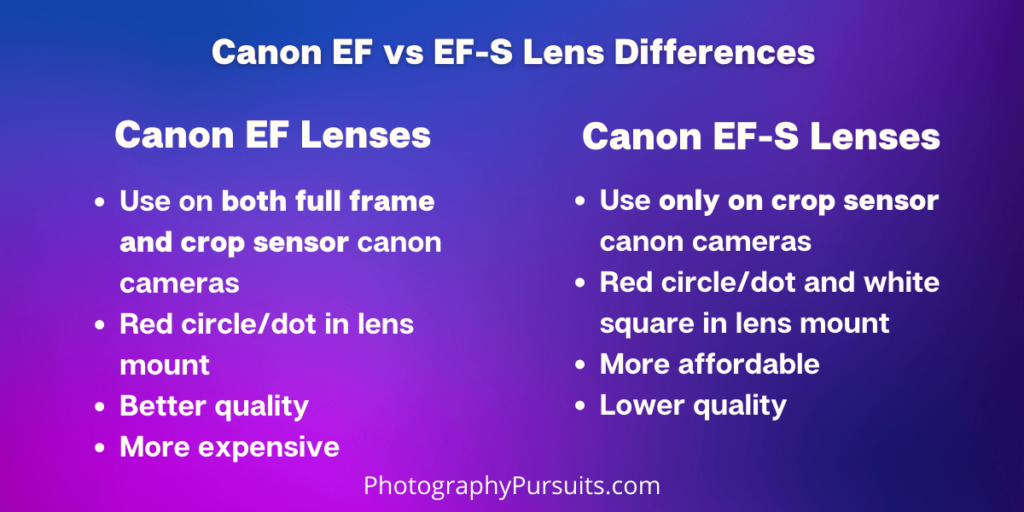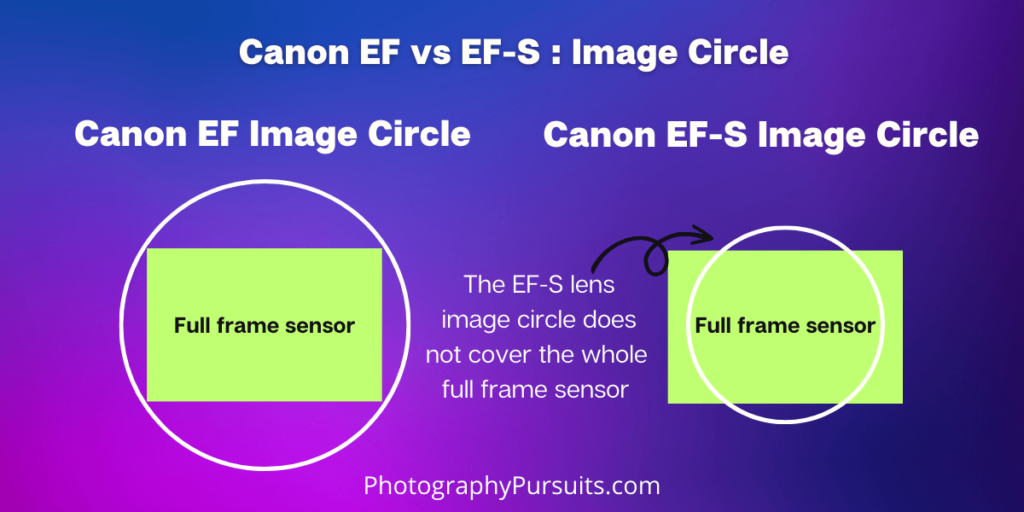Canon’s EF and EF-S lenses are both made for Canon DSLR cameras, but one of them is designed for full frame cameras whereas the other is designed for crop sensor cameras.
This means there are some rules you need to follow to make sure you don’t try and use the wrong lens on the wrong camera.
Here’s a quick graphic summarising the main things you need to know about EF and EF-S lenses:

One thing that’s not included in the graphic above is that EF-S lenses have a smaller image circle (I’ll go through this in a bit).
Table of Contents
What Is The Difference Between Canon EF and EF-S Lenses?
Canon EF lenses are lenses made for Canon’s full frame cameras and they have the Canon EF mount.
On the other hand, Canon EF-S lenses are made for Canon’s crop sensor cameras and they have the Canon EF-S mount.
Since they are designed for two different types of Canon cameras, EF and EF-S lenses are not the same.
EF-S lenses are made for smaller crop sensors, so the image circle of EF-S lenses are smaller.
What this means is that if you tried to put an EF-S lens on a full frame Canon camera then a portion of the sensor would not receive any light through the lens.

The part of the sensor that isn’t covered by the image circle of the lens will just show up black on any image you try to take.
This is why EF-S lenses are made for crop sensor cameras.
Can You Use EF-S lenses On A Full Frame Camera?
No, you should not try to put EF-S lenses on a full frame Canon camera because it can damage your camera and the image won’t come out correct.
As I mentioned above EF-S lenses do not fit properly on full frame cameras because the image circle of EF-S lenses are too small.
Not only this, but using an EF-S lens on a full frame camera can seriously damage the camera and it’s mirror!
The reason for this is that EF-S lenses are not built in the right dimensions for a full frame camera so they can end up going too far back into the camera and damaging the mirror.
You definitely don’t want to risk this. So don’t do it.
Can You Use EF Lenses On A Crop Sensor Camera?
Yes you can use EF lenses on crop sensor Canon cameras.
Luckily Canon has made EF-S mount cameras compatible with EF lenses so you’ll have a much larger range of lenses that you can use.
The only thing you do need to remember though is that there is a crop factor whenever you use a crop sensor camera.
Anytime you use a lens on a crop sensor Canon camera you have a crop factor of about 1.6x applied.
This means that even though the lens might say it’s 35mm it will actually be more like 56mm on a full frame camera.
How To Identify EF And EF-S Lenses?
It’s actually pretty easy to know whether your Canon lens is EF or EF-S.
If it’s an EF lens then it will have a red dot on the lens to mark it as an EF lens.
If it’s an EF-S lens then it will have a white square on the lens to mark it as an EF-S lens.
How To Tell If Canon Camera Will Fit EF Or EF-S Lens?
The easiest way is to Google “your camera name” + “is it full frame or crop sensor”.
If it’s a full frame Canon DSLR then you can only use EF lenses on it.
If it’s a crop sensor then you can use both EF and EF-S lenses on it.
If Google is not helpful then you can also check a different way by looking at the lens mount on your camera.
Take your lens off if you have one and look at the lens mount of your camera.
If you see a red circle/ dot and a white square on your lens mount then you have a crop sensor Canon DSLR.
If you only see a red circle/dot then you have a full frame Canon DSLR.
Lenses are not the only thing that’s different between full frame and crop sensor cameras.
Should I Buy An EF Or EF-S Lens?
The best way to go about this is to think about your needs first.
If you have a crop sensor Canon camera
In this case you can use both EF and EF-S lenses, but if you’re not a professional and you don’t have a massive budget, just use EF-S lenses.
It’s easy enough to find plenty of EF-S lenses that match your shooting style so it’s not like you’re going to be lacking options.
Although, if you’re willing to spend a bit more go for EF lenses because they are higher quality and you will be able to use them on a full frame DSLR if you upgrade in the future.
If you have a full frame Canon camera
If you have a full frame Canon camera then you will need to use EF lenses. You have no choice here.
But if you have the budget for a full frame camera then you probably also have the budget for more expensive EF lenses.
Luckily you can still get quite a few affordable EF lenses. My favourite affordable EF lens to use is the Canon EF 50mm f/1.8 STM lens.
FAQS
What Exactly Are EF Lenses?
The EF stands for electro focus which refers to the electronic autofocus mechanism.
EF lenses were originally made for the EF lens mount which is the standard lens mount for Canon’s EOS system of cameras.
EF lenses can be used on both crop sensor cameras (EF-S lens mount) and full frame cameras (EF lens mount).
What Exactly Are EF-S lenses?
In 2003, Canon released the EF-S lens mount which was designed to be used on their APS-C cameras (these are the cameras with a crop sensor).
These EF-S lenses tend to be for beginner and mid range cameras in Canon’s range.
They’re built to be more economical than EF lenses so they tend to be lighter, smaller in size and more affordable.
Do The Lenses Affect The Crop Factor?
No, the crop factor on Canon cameras is to do with the sensor size and not the lens.
Canon APS-C cameras are crop sensor cameras and they have a crop factor of about 1.6x.
This is regardless of whether you are using an EF lens or an EF-S lens.
So whether you use a 50mm EF lens or a 50mm EF-S lens on a crop sensor canon camera, the full frame equivalent focal length will still be about 80mm (50mm x 1.6= 80mm).
EF VS EF-S Lenses Video
You might also find the video below useful to recap some of the stuff in this post.
Related reading:
To find out more about Canon lenses see what different colors mean on Canon lenses.
